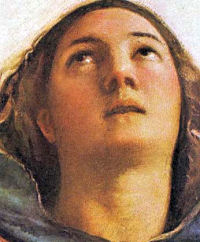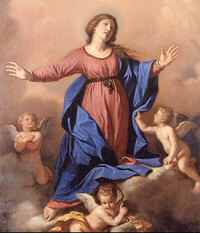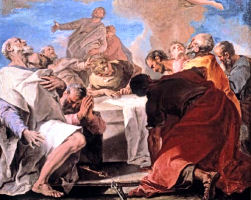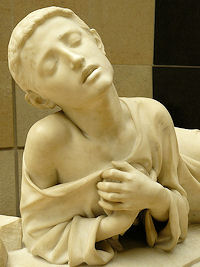Assumpta Est Maria
Assumpta est Maria in caelum, gaudent angeli, laudantes benedicunt Dominum! Mary has been taken up into heaven; the angels rejoice and, praising, bless the Lord! The Virgin in whose womb reposed the Author of Life is preserved from the corruption of the tomb. The Mother of God is assumed body and soul into the splendour of the Father, the Son, and the Holy Ghost. Escorted by myriads of angels in jubilation, the Queen of Heaven advances toward her Son, who sits enthroned amid the stars.
Even Within the Veil
In a sense, the Assumption of the Mother of God is the liturgy of her Great Entrance; the feast of her oblation in the heavenly sanctuary, "the tabernacle, which the Lord hath pitched, and not man" (Heb 8:2). She is the Mother of Holy Hope. She is given to us to be our strongest comfort, to be the anchor of our souls, "sure and firm, and which entereth in even within the veil" (Heb 6:18-19).
Our Lady's Pascha
Today heaven and earth keep the summer festival of Marymas, Ladyday-in-the-Harvest, the Pascha of the all-holy Mother of God. She has passed into the great summer that, stretching from the springtime of the Resurrection until the return of the Lord in glory, presages the shining harvest of all the saints. The song of the angels soars, stretching, swelling, and cresting from choir to choir. The soul of the Virgin magnifies the Lord and her God-bearing flesh rejoices (Lk 1:46).
The Temple and the Ark
"And the temple of God was opened in heaven: and the ark of His testament was seen in His temple" (Apoc 11:19). In the First Book of Chronicles, we see the Ark of the Covenant solemnly transported to the tent made ready by David to receive it. David is the figure of Christ of whom he sings in the psalm, "He hath set his tabernacle in the sun" (Ps 18:6).
That Where I Am, You Also May Be
The Virgin Mary is the Ark of the Covenant, carried aloft by heavenly levites into the tent prepared for her by the King of Kings, the glorious Son of David, our Lord Jesus Christ. As she advances, angels raise sounds of joy on harps and lyres and cymbals and, in accord with the command of David, the appointed singers sing (1 Chr 15:16). Behold the wondrous fulfillment of what the Lord had promised: "In my Father's house there are many mansions. If not, I would have told you: because I go to prepare a place for you. And if I shall go, and prepare a place for you, I will come again, and will take you to myself; that where I am, you also may be" (Jn 14:2-3).
Arise, Make Haste
But listen! "The voice of my beloved, behold he cometh leaping upon the mountains, skipping over the hills" (Ct 2:8). In speaking to His Mother, Christ speaks to His Bride, the Church, and in speaking to His Bride the Church, He speaks to every soul washed in Baptism, sealed in Chrismation with the kiss of the Holy Ghost, and nourished at the banquet of His Body and Blood. "Arise, make haste, my love, my dove, my beautiful one, and come" (Ct 2:10); for lo, the winter of our separation is past, the rain of so many tears is over and gone.
When I Appear Before His Sight
"I slept," says the Virgin of the Dormition, "I slept, but my heart kept watch." Ct 5:2). The heart of the Virgin is quickened and her flesh is suffused with fire. "Oh, how I rejoiced when I heard my Son say to me, 'Let us go up to the house of the Lord'" (cf. Ps 121:1). "One thing I have asked of the Lord, this will I seek after; that I may dwell in His Father's house all the days of my life, that I may see the delight of the Lord" (Ps 26:4), and "when I appear before His sight, I shall be satisfied with the appearing of His glory" (Ps 16:15).
Thy Voice is Sweet and Thy Face Comely
Listen to the words of the Son. "Arise my love, my fair one, and come away (Ct 2:13) for I desire that thou, my mother, first among those whom the Father hath given me, shouldst be with me where I am, to behold my glory, the glory given me by my Father in his love for me before the foundation of the world (cf. Jn 17:24). All of heaven longeth to see thy face, Mother, and the angels yearneth to hear thy voice, "for thy voice is sweet, and thy face is comely" (Ct 2:14).
The Woman Clothed with the Sun
We see the Queen of Heaven "coming up from the wilderness, like a column of smoke, perfumed with myrrh and frankincense" (Ct 3:6). The prophet Isaiah sees her coming from afar, recognizes the Virgin of the Sign (Is 7:14), the Mother of Emmanuel, and stands to greet her. "Arise, shine; for your light has come, and the glory of the Lord has risen upon you . . . The Lord will arise upon you, and his glory will be seen upon you" (Is 60:1-2). She is the woman "clothed with the sun, with the moon under her feet, and on her head a crown of twelve stars" (Apoc 12:1).
Hidden with Christ in God
The Mother of God has put on the imperishable; she is clothed in immortality (1 Cor 15:54). The Apostle lifts his voice in praise of the God who gives us the victory through our Lord Jesus Christ (1 Cor 15:57). Mary, first of all, knows the fullness of Christ's glorious triumph in her flesh. Mary is the first-fruits of the harvest sown by Jesus in his blessed Passion and Death. Mary is the first to follow Him into the glory of his Resurrection and Ascension. Her life now is hidden with the life of Christ in God (Col 3:3), and when He who is our life appears, then she also will appear with him in glory (Col 3:4). Mary waits for her children to join her, the small and the great, for the marriage of the Lamb has come and his Bride has made herself ready (Apoc 19:7).
Mary Hath Chosen the Better Part
And so, led by kings and levites, by angels, prophets and apostles, we make our way to the Gospel of the Assumption so cherished by the ancient liturgical traditions of both East and West for the Dormition of the Virgin, for "Mary hath chosen the better part, which shall not be taken away from her" (Lk 10:42).
The Virgin of Nazareth who surrendered her heart, her soul, and her flesh to the Word and the overshadowing of the Holy Ghost;
the Virgin of Bethlehem, joyful in her poverty;
the Virgin of Egypt, trusting in her exile;
the Virgin of Jerusalem, anguished and amazed by her child;
the Virgin of Cana, strong in her intercession;
the Virgin of Calvary, faithful in her compassion;
the Virgin of Holy Saturday, silent and indomitable in her hope;
the Virgin of the Cenacle, persevering in prayer;
the Virgin of the Mount of Olives, ardent in her desire,
has, at last, come to rest at the feet of her Son.
The One Thing Necessary
"And she had a sister called Mary who sat at the Lord's feet and listened to His teaching" (Lk 10:39). Behold our sister, Blessed Mary Ever-Virgin, seated at the feet of our Lord! Behold our Mother, Blessed Mary Ever-Virgin, in repose at the feet of her Son! She is seated at His feet in glory, higher than the seraphim and cherubim, exalted above all the angelic choirs, for to her is given the One Thing Necessary (Lk 10:42) in heaven and on earth. "Whom have I in heaven but thee? And there is nothing upon earth that I desire besides thee" (Ps 73:25).
A Mother Close to Her Children
Think not for a moment that the Assumption places a distance between us and the all-holy Mother of God. Quite the contrary. Her exaltation has made her closer to us than we can dream or imagine. The all-holy Virgin is mother, completely mother, and the desire of every mother is to be close to her children.
From her place of glory in heaven, she stoops down to us, attentive to our sufferings. Her compassion illumines this valley of tears. Her Assumption has not separated her from us. The Assumption is not a mystery of distance and separation but a mystery of nearness and of communion. Now set free from the limitations of space and of time, the holy Mother of God is capable of being present to all her children, to the little ones especially, to the broken-hearted, the weak, and the poor.
Mother of Mercy
Glorious in her Assumption, the Virgin Mother has but one desire: to do for each one of us what a loving mother would do for her child. Her weakness is for the poorest among us. Her predilection goes to those who stumble and fall rather than to those who walk straight and tall, to those who, bearing within themselves deep and secret wounds, are most in need of her attentions and care.
Let us lift up our eyes to the All-Holy Mother of God and Blessed Virgin Mary, praising and confessing the wonderful mystery of her Assumption. Today, dear brothers, she will hear all your requests, answering them according to the wisdom and love of her Immaculate Heart.
The Joys of Heaven
Today, she pierces all our darknesses with a ray of heavenly light. Her desire is to share with us the joys of heaven, the very joys that flood her body and her soul in the glory of her Son.
And for all of that, we need not wait. Already, here and now, we are invited to the marriage supper of the Lamb (Apoc 19:9). Let us rejoice and exult and give him the glory (Apoc 19:7) who with the Father lives and reigns in the unity of the Holy Ghost, and who will come again, as he promised, to take us to Himself (Jn 14:3). "Amen. Come, Lord Jesus!" (Apoc 22:20).

 Now toward the end of the summer season, at a time when fruits are ripe in the gardens and fields, the Church celebrates the most glorious "harvest festival" in the Communion of Saints. Mary, the supremely blessed one among women, Mary, the most precious fruit which has ripened in the fields of God's kingdom, is today taken into the granary of heaven.
Now toward the end of the summer season, at a time when fruits are ripe in the gardens and fields, the Church celebrates the most glorious "harvest festival" in the Communion of Saints. Mary, the supremely blessed one among women, Mary, the most precious fruit which has ripened in the fields of God's kingdom, is today taken into the granary of heaven.  of her life and her part in the work of redemption. The central mystery of her life and person is her divine motherhood, celebrated both at Christmas and a week later (Jan. 1) on the feast of the Solemnity of Mary, Mother of God. The Immaculate Conception (Dec. 8) marks the preparation for that motherhood, so that she had the fullness of grace from the first moment of her existence, completely untouched by sin. Her whole being throbbed with divine life from the very beginning, readying her for the exalted role of mother of the Savior.
of her life and her part in the work of redemption. The central mystery of her life and person is her divine motherhood, celebrated both at Christmas and a week later (Jan. 1) on the feast of the Solemnity of Mary, Mother of God. The Immaculate Conception (Dec. 8) marks the preparation for that motherhood, so that she had the fullness of grace from the first moment of her existence, completely untouched by sin. Her whole being throbbed with divine life from the very beginning, readying her for the exalted role of mother of the Savior.  Tarcisius was a twelve-year-old acolyte during one of the fierce Roman persecutions of the third century, probably during that of Valerian. Each day, from a secret meeting place in the catacombs where Christians gathered for Mass, a deacon would be sent to the prisons to carry the Eucharist to those Christians condemned to die. At one point, there was no deacon to send and so St. Tarcisius, an acolyte, was sent carrying the "Holy Mysteries" to those in prison.
Tarcisius was a twelve-year-old acolyte during one of the fierce Roman persecutions of the third century, probably during that of Valerian. Each day, from a secret meeting place in the catacombs where Christians gathered for Mass, a deacon would be sent to the prisons to carry the Eucharist to those Christians condemned to die. At one point, there was no deacon to send and so St. Tarcisius, an acolyte, was sent carrying the "Holy Mysteries" to those in prison. 





